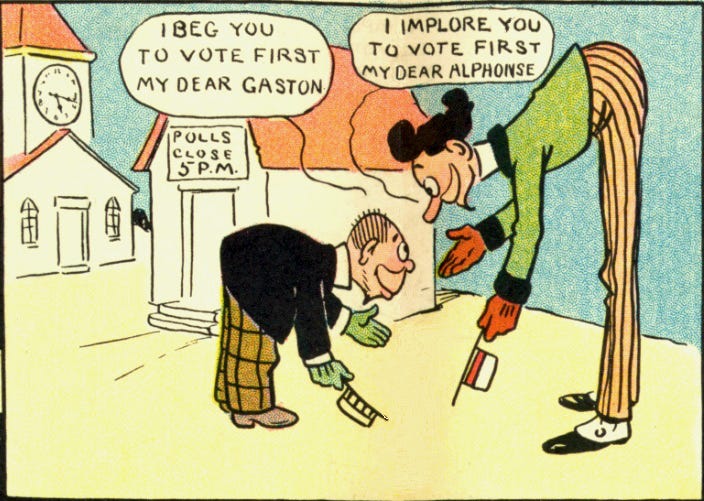I’ve been thinking a lot about the word “unprecedented.”
In the before times — before Donald Trump entered the political scene and the coronavirus pandemic swept the globe — it was used sparingly. As a longtime opinion editor, I approached it with caution and took to adding qualifiers: “Virtually unprecedented” was my go-to trope. All too often, something cited as unprecedented had happened before.
Since Trump entered the 2016 presidential campaign, however, “unprecedented” has become ubiquitous. From slamming military heroes to decrying America, Trump seems to delight in the “unprecedented.”
Right now, the deeply unsettling standoff between the Trump administration and the federal courts could well result in an unprecedented result: Judges holding Justice Department lawyers in contempt of court.
The White House’s likely impending faceoffs with the U.S. Supreme Court are approaching unprecedented as well. For the administration is playing fast-and-loose with the Supremes’ recent unanimous decision — “pretending it is complying,” as The Atlantic’s Adam Serwer writes, “while refusing to do so.”
Serwer lays it all out in his newest smart piece, “The Constitutional Crisis Is Here”:
Since last week’s Supreme Court directive, Trump officials have harped on a line stating that the lower court should clarify its “directive, with due regard for the deference owed to the Executive Branch in the conduct of foreign affairs.” Officials including [Stephen] Miller and Secretary of State Marco Rubio have interpreted that to mean that they do not have to follow the order at all. During the Oval Office meeting, Rubio chimed in to say that “no court in the United States has a right to conduct the foreign policy of the United States.”
In other words, the administration is following the Supreme Court’s ruling by ignoring it completely.
Meanwhile, Trump keeps asserting that the Supremes ruled 9-0 in his favor.
This fierce fight was ignited by the administration’s unlawful deportation of Kilmar Abrego Garcia, who, as a teenager, had fled the terrors of El Salvador for the United States in 2011. He now has an American wife and child as well as steady employment. In addition, an immigration judge ruled in 2019 that Abrego Carcia had the legal right to remain, since he feared prosecution in his native land.
The Trump administration admitted in court that grabbing Abrego Garcia was an error. There seems no solid evidence that he was part of the violent Salvadoran gang MS-13.
Yet, he was sent to El Salvador’s infamous prison, Centro de Confinamiento del Terrorismo, after being swept up by U.S. Immigration and Customs Enforcement officials, who abducted him in front of his young autistic son.
Trump officials, like Homeland Security Adviser Miller, continue to insist — outside of court — that this deportation is no error. They have strong support from many GOP members of Congress, who declare: “While Democrats are fighting on behalf of illegal criminals on your dime, Republicans will continue [to] fight for the safety of American citizens.”
Things got even more surreal when El Salvador President Nayib Bukele, during his Monday Oval Office visit, played an elaborate game of Alphonse and Gaston with Trump as they discussed Abrego Garcia. Each insisted that the other had custody.
It would have sounded less spurious if Washington wasn’t paying El Salvador to keep planeloads of people in prison. And Trump hadn’t said he was open to sending U.S. citizens to foreign prisons.
The Bulwark’s Jonathan V. Last viewed this scene in stark terms:
Congressional Democrats should do the job that Justice Department lawyers, in contravention of the Supreme Court, are refusing to do. They should take it upon themselves to facilitate the return of Abrego Garcia. …
This will require a paradigm shift for Democrats. They will have to act less like an American political party and more like Solidarity in Poland in the 1980s or Alexei Navalny’s People’s Alliance over the last decade.
But they should be under no illusions. The old American order is dead. It ended on April 14, 2025, when a Latin American strongman sat in the Oval Office and discussed sending U.S. citizens to foreign concentration camps with the American president while they jointly defied the Supreme Court.
Josh Marshall, the astute founder and overarching editor of Talking Points Memo, cuts to the heart of the matter:
We can talk endlessly about whether we’re still in a democracy or whether Trump wants to be or is acting like a dictator. We can debate words such as “fascism” that were unknown before a century ago. But what we are seeing right now is the definition of tyranny, a half-archaic concept the founders of the American Republic were very familiar with. Trump’s rule is both lawless and arbitrary. He has taken the bundle of powers the Constitution provides him to govern and defend the Constitution and turned them to an entirely different and corrupt purpose: using them as weapons to attack the people and institutions he deems his enemies.
This kind of creature is precisely what the core architects of the constitutional order said the document could never be used to create. The President is no King; he is subject to the law. And yet here we are. And it is the fraudulent doctrine of unitary executive authority which is walking before him like a statutory bushwhacker, clearing a path for him through every law and restraint.
Meanwhile, Federal District Court Judge James Boasburg is threatening the administration with contempt charges because of its “willful disregard” of his order to halt deportation flights. The Executive Branch has until Apr. 23 to clear up who is responsible for sending more than 200 people to foreign prisons despite Boasburg’s orders not to.
In another extremely fraught case, District Court Judge Paula Xinis in Maryland, is still trying to assess the administration’s level of compliance with the Supremes’ ruling that it must “facilitate” Abrego Garcia’s return to U.S. soil. Contempt charges are again being mentioned.
When the U.S. government sought to appeal her actions, the Fourth Circuit Court of Appeals smacked down the administration’s arguments with surprising alacrity. Judge Harvie Wilkinson, appointed by President Ronald Reagan, was having none of it. He did all he could to fend off what he noted others might view as a constitutional crisis:
“Facilitate” is an active verb. It requires that steps be taken as the Supreme Court has made perfectly clear. The plain and active meaning of the word cannot be diluted by its constriction, as the government would have it, to a narrow term of art. …
“Facilitation” does not permit the admittedly erroneous deportation of an individual to the one country’s prisons that the withholding order forbids and, further, to do so in disregard of a court order that the government not so subtly spurns. ... Allowing all this would “facilitate” foreign detention more than it would domestic return. It would reduce the rule of law to lawlessness and tarnish the very values for which Americans of diverse views and persuasions have always stood. …
It is, as we have noted, all too possible to see in this case an incipient crisis, but it may present an opportunity as well. We yet cling to the hope that it is not naïve to believe our good brethren in the Executive Branch perceive the rule of law as vital to the American ethos. This case presents their unique chance to vindicate that value and to summon the best that is within us while there is still time.
This degree of government non-compliance with court orders is indeed — you guessed it — unprecedented.
As the nation is now experiencing, some things are better off being “precedented.”
What’s not unprecedented, however, are terrifying secret sweeps by government agents. The United States has been-there-done-that as far these are concerned.
Consider the Palmer raids, which the Justice Department launched in October, 1919, in response to a series of bombing incidents and labor strikes across the nation — regularly tied to the Bolsheviks who had recently seized power in Russia. The raids continued into 1920, as Attorney General A. Mitchell Palmer sought to arrest and deport a wide cross-section of the radical left.
The Palmer raids were actually orchestrated by a young Justice Department lawyer named J. Edgar Hoover, whom Palmer had appointed head of the department’s Radical Division. Squadrons of federal agents seized not only notable political radicals, including Communists and anarchists, like Emma Goldman, but also union members, immigrants — particularly Italians and Eastern European Jews, progressive leaders and influential writers.
More than 6,000 people were arrested. These undemocratic sweeps led to the creation of the American Civil Liberties Union — which we saw swing into action again on Friday. The Supremes were responding to an ACLU appeal when they blocked more deportations early Saturday morning.
On the Palmer raids’ 100th anniversary, back in 2019, the historian and journalist Adam Hochschild wrote a terrific commentary for The New Yorker, “When American Tried to Deport its Radicals.”
Hochschild details one exchange between Goldman and Hoover, after his agents had picked her up and were taking her on a tugboat to the ship for deportation. Goldman, of course, gets the last word:
“Haven’t I given you a square deal, Miss Goldman?” Hoover asked, as they steamed toward Brooklyn in the darkness.
“Oh, I suppose you’ve given me as square a deal as you could,” she replied, two hours away from being ejected from the country where she had lived for 34 years and found the voice that had won her admirers around the world. “We shouldn’t expect from any person something beyond his capacity.”
Unfortunately for Hoover — and Palmer — a man named Louis F. Post was then acting Labor Secretary. Before entering public life, Post had been a crusading journalist, writing editorials that defended labor unions, advocated women’s rights and slammed immigration restrictions. Post saw the raids as a witch hunt and, as acting Labor Secretary, he was able to quash roughly 3,000 arrest warrants after he learned that many raids were conducted without warrants, or using warrants based on faulty information. He lowered bail for many others.
Hochschild lays out how Post was able to halt the deportations — though only after the first ship had left port. Palmer’s fury over Post’s actions actually resulted in what Trump often threatens: impeachment.
The Attorney General condemned Post’s “habitually tender solicitude for social revolution and perverted sympathy for the criminal anarchists.” Privately, Palmer suggested that Post was “a Bolshevik himself.” Palmer and Hoover sought to discredit Post and get him impeached by Congress. A 350-page file on Post attempted to tarnish him with evidence about everything from contacts with I.W.W. members [Industrial Workers of the World, known as Wobblies], to his advocacy of divorce reform. The House Rules Committee, supplied with this file, called Post in for 10 hours of testimony. But he acquitted himself brilliantly, and the committee could find no grounds for impeachment.
As for impeaching a judge — which Trump regularly demands — in the 15 times it has occurred in U.S. history, it has been for crimes or corruption while on the bench.
I don’t think that includes issuing opinions that anger a president.
Plus: Seeing Lawlessness as Strength
MEANWHILE, Trump has long maintained a quizzical attitude when it comes to the rule of law. He can, it seems, take it or leave it.
He is abetted in this by his base. The president rarely receives a rebuke from his supporters when trash-talking a judge or smacking down a court ruling in the most derisive terms.
There is an acute danger in this. As the incisive law professor, Aziz Huq, recently explained to The New York Times:
Usually, voters won’t reward their elected leaders for violating norms, disrupting a stable constitutional order or taking actions that are intrinsically unlawful, said Aziz Huq, a law professor at the University of Chicago and co-author of the book “How to Save a Constitutional Democracy.”
But that calculus may not apply to Trump, who has based his political appeal on gleefully flouting sacrosanct norms. Refusing to accept courts’ authority may actually appeal to the president’s base, Huq said, if they take it as evidence of strength rather than lawlessness.
Trump had caught on to this skill set early on. Consider his startling assertion during the 2016 presidential campaign: “I could stand in the middle of 5th Avenue and shoot somebody and I wouldn’t lose voters.”
He leaned in on this as well with his persistence in maintaining the false claim that he won the 2020 presidential campaign.
At this point, more than half the nation is wondering if Trump’s supporters will ever grow significantly disenchanted.
We’ll see how it all plays out…








